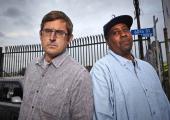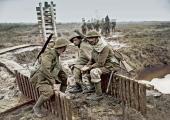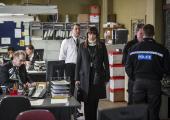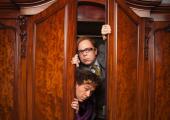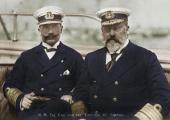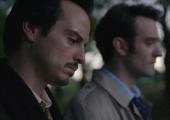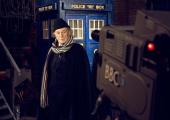THE SCIENCE OF DOCTOR WHO, BBC TWO Celeb prof puts the science into science fiction
Celebrity professor puts the science into science fiction as anniversary celebrations begin
Today’s special preview of the impending 50th anniversary episode of Doctor Who finally filled in some of what happened in the gap between Paul McGann’s 1996 made-for-TV movie and the show’s 2005 televisual regeneration (Big Finish audios notwithstanding, obviously). So it was appropriate that today’s other Who-related event, a one-off tie-in documentary fronted by Professor Brian Cox, began by doing its best to bridge the gap between its presenter’s time in 90s dance-pop band D:Ream and his own unlikely regeneration as one of TV science’s most famous personalities.
There are plenty of aspects of Doctor Who worth examining through a scientific lensPersonally, I’d happily watch an hour of back-and-forth between Cox and current Doctor Matt Smith - their short scenes, interspersing the rest of the show’s lecture format, were a joy to watch - but the show had unfortunately promised Proper Science, with the usual celebrity guests, rather than a jaunt in the TARDIS. Thankfully Cox is an engaging lecturer, which seems as good an explanation as any for why the majority of those celebrity guests remained stuck to their seats throughout.
Cox began, as all good lecturers do, by setting out his thesis - by the end of his allotted hour, he wanted to demonstrate whether it was or was not possible to travel in time just like the Doctor. With all of space and time to choose from, his goal was modest - Dr Michael Faraday’s Christmas Lecture on the chemical history of the candle from 1860, given in the same building from which he was addressing his audience. Faraday’s theories popped up again throughout, as did those of Albert Einstein and Italian physicist Enrico Fermi, whose ‘Fermi Paradox’ is the apparent contradiction between the likelihood of the existence of extraterrestrial life and the fact that we on Earth have not yet seen any evidence of said life.
There are plenty of aspects of Doctor Who worth examining through a scientific lens - I for one would love to see a few of those times the Doctor saved the day armed with nothing more than his trusty sonic screwdriver debunked - so it was a bit of a shame that Cox’s lecture focused solely on the big questions: those of time travel and alien life. Though Cox and his volunteers (former Bang Goes the Theory man Dallas Campbell, Charles Dance, Professor Jim Al-Khalili and comedian Rufus Hound) were able to recreate some of the science through simple on-stage experiments, there was no chance that we were going to meet a genuine Martian by the lecture’s end or that Cox would be able to have a cup of tea with his beloved Faraday and be home in time for supper.
By 10pm we had learned that it was theoretically possible to travel into the future, if you didn’t mind a 10-year detour around outer space, that a former pop star with a considerable IQ needs to have LSD jokes explained to him and that, if you were going to throw Rufus Hound out of the universe through a black hole - or at least a convincing picture of one - you’d never actually see him disappear. Whether the rather complex science had stuck was another matter - but it was certainly an interesting, and fun, place to start.
Overleaf: watch the latest trailer for Dr Who 50th Anniversary celebrations on Saturday 23rd November
